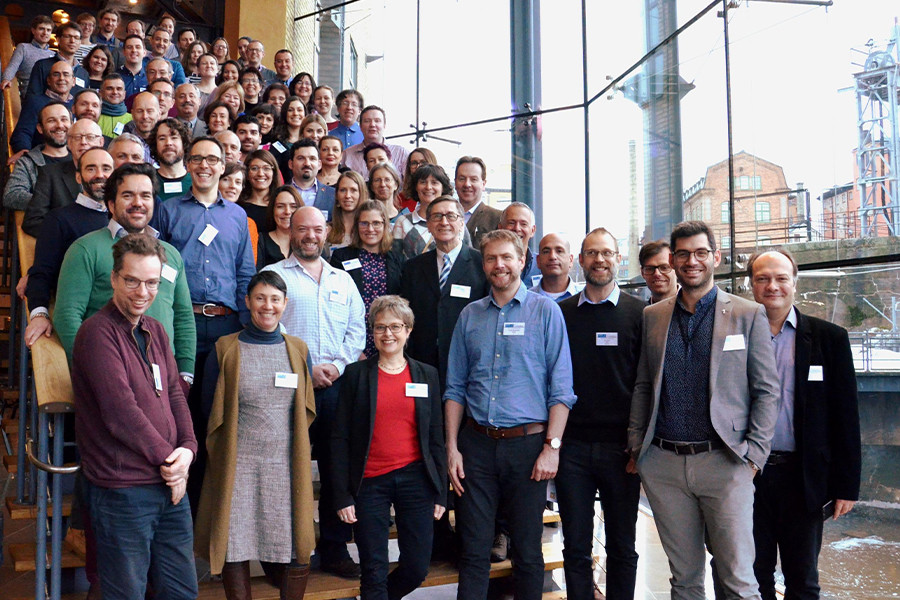
The EFAS 13th annual meeting was held in Norrköping, Sweden. It was officially opened by Mr. Rolf Brennerfelt, General Director at SMHI. The meeting featured general EFAS information, three work shops, six poster presentations, two partner presentations about extreme flooding events, and two partner presentations about new developments in their organisation. The focus of the meeting was partner networking and sharing experiences. Minutes and presentations from the meeting are available on EFAS-IS www.efas.eu/home.
Information from EFAS centres
EFAS DISS informed the audience about new partners who have joined since the last annual meeting, how many notifications had been issued during the last year and about training opportunities for EFAS part-ners. From the hydrological data collection centre information was given about their work regarding communication with data providers. They also an-nounced that one of the consortium members, Elimco, has changed their name to Soologic. EFAS METEO gave a general overview of the data pro-cesses and what has been done since last year. They also gave information about their new interpolation method and data in the new domain. Both data col-lection centres encouraged all the partners to share their data. The computational centre went through their key activities during last year, such as model upgrades and the work on the extended domain.
Future of EFAS
Peter Salamon (JRC) presented what is next for EFAS. The extension of the EFAS domain will happen in spring 2018, and will open up for more EFAS partners. Among other things, Peter talked about incorporation of social media into EFAS, new developments and the new EFAS web interface.
Foreseen changes to the Union Civil Protection Mechanism legislation
This year DG-ECHO was present at EFAS annual meeting and held a presentation on foreseen changes to the Union Civil Protection Mechanism legislation. Within the civil protection mechanism any member state can request assistance. During 2017 there were 32 activations of the service, mostly for forest fires.
New EFAS-IS interface
The developers of the new EFAS-IS interface, Commpla, had a longer presentation with a discussion session and user survey. They went through the objectives, the map viewer functionalities and the layout for the new interface. Some new features will be a dashboard where you can have personal set-tings, and the ability to access the webpage in different languages.
Presentations on extreme events and new developments from EFAS partners
Two presentations were held covering extreme events. Elena Anghel from Institutul National de Hidrologie si Gospodarire a Apelor (INGHA) held a presentation about a flash flood event in 2017 in Romania. Vesela Stoyanova from the National Insti-tute of Meteorology and Hydrology in Bulgaria presented a summary of all received EFAS flood notifications of 2017.
Two presentations were held covering new devel-opments from EFAS partners. Amir Givati from Israeli Hydrological Service presented “The advantage of using data assimilation and ensemble of precipitation for flood forecasting in Israel” and Alexey Romanov from the Hydrometeorological Research Centre of Russia presented “Some problems of channel hydrodynamics and data processing from UAV (Unmanned Aerial Vehicles)”.
Workshops
The attendees were divided into three groups and were given the opportunity to participate in three different workshops. Workshops were held on the following topics:
• How to mutually benefit from information exchange between EFAS and partners
• How to use EFAS WMS and SOS web services and data archiving
• Added value from the new products in EFAS-IS
All the workshops started with a presentation. During each workshop, the participants were engaged in different activities with the aim of gaining more knowledge.
Open data
Peter Salamon (JRC) held a longer session about EFAS and open data. EFAS currently shares only archived data older than one month whereas the real-time flood forecasts are restricted to EFAS partners only. The focus of this session was to start discussing with all EFAS partners if and how we can make more information public but still protect the relevant authorities interests and responsibilities regarding flood forecasting. Many questions were asked and fruitful discussions took place. Many partners acknowledged that the trend towards open data cannot be stopped but that we need to find solutions that flood warnings, which are responsibility of the relevant national/regional authorities, have a strong and consistent message towards the public and relevant stakeholders. Through its strong community the EFAS partner network has a chance to influence and even lead this future development in flood forecasting.
Summary
Overall, it was a very busy meeting with a lot of good dialogue and interactions both during presentation and during breaks. The attendees also had the opportunity to attend a guided tour around the Norrköping industrial landscape and enjoy an excel-lent dinner at the conference centre Louis De Geer.